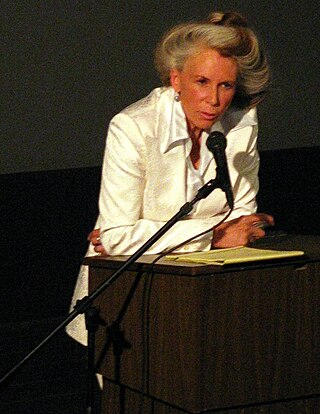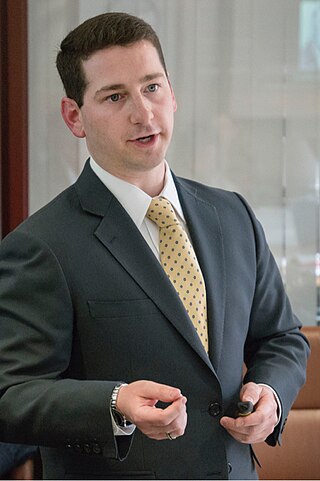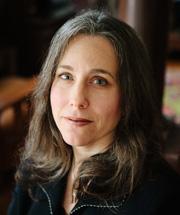Related Research Articles

Stanford Law School (SLS) is the law school of Stanford University, a private research university near Palo Alto, California. Established in 1893, Stanford Law had an acceptance rate of 6.28% in 2021, the second-lowest of any law school in the country. George Triantis currently serves as Dean.

Catharine Alice MacKinnon is an American feminist legal scholar, activist, and author. She is the Elizabeth A. Long Professor of Law at the University of Michigan Law School, where she has been tenured since 1990, and the James Barr Ames Visiting Professor of Law at Harvard Law School. From 2008 to 2012, she was the special gender adviser to the Prosecutor of the International Criminal Court.
The Equal Protection Clause is part of the first section of the Fourteenth Amendment to the United States Constitution. The clause, which took effect in 1868, provides "nor shall any State ... deny to any person within its jurisdiction the equal protection of the laws." It mandates that individuals in similar situations be treated equally by the law.

John Hart Ely was an American legal scholar. He was a professor of law at Yale Law School from 1968 to 1973, Harvard Law School from 1973 to 1982, Stanford Law School from 1982 to 1996, and at the University of Miami Law School from 1996 until his death. From 1982 until 1987, he was the 9th dean of Stanford Law School.

The University of Virginia School of Law is the law school of the University of Virginia, a public research university in Charlottesville, Virginia.

Anti-discrimination law or non-discrimination law refers to legislation designed to prevent discrimination against particular groups of people; these groups are often referred to as protected groups or protected classes. Anti-discrimination laws vary by jurisdiction with regard to the types of discrimination that are prohibited, and also the groups that are protected by that legislation. Commonly, these types of legislation are designed to prevent discrimination in employment, housing, education, and other areas of social life, such as public accommodations. Anti-discrimination law may include protections for groups based on sex, age, race, ethnicity, nationality, disability, mental illness or ability, sexual orientation, gender, gender identity/expression, sex characteristics, religion, creed, or individual political opinions.
Critical race theory (CRT) is an academic field focused on the relationships between social conceptions of race and ethnicity, social and political laws, and mass media. CRT also considers racism to be systemic in various laws and rules, not based only on individuals' prejudices. The word critical in the name is an academic reference to critical theory rather than criticizing or blaming individuals.

Law school rankings are a specific subset of college and university rankings dealing specifically with law schools. Like college and university rankings, law school rankings can be based on empirical data, subjectively-perceived qualitative data, or some combination of these. Such rankings are often consulted by prospective students as they choose which schools they will apply to or which school they will attend. There are several different law school rankings, each of which has a different emphasis and methodology.

In the United States, affirmative action consists of government-mandated, government-approved, and voluntary private programs granting special consideration to groups considered or classified as historically excluded, specifically racial minorities and women. These programs tend to focus on access to education and employment in order to redress the disadvantages associated with past and present discrimination. Another goal of affirmative action policies is to ensure that public institutions, such as universities, hospitals, and police forces, are more representative of the populations they serve.
Kiwi Alejandro Danao Camara, also known as K.A.D. Camara, is a Filipino American attorney and businessman known for being founder and former CEO of CS Disco. He also represented defendant Jammie Thomas-Rasset in the first file-sharing copyright infringement lawsuit in the U.S. brought by major record labels to be tried by a jury. Camara abruptly resigned from CS Disco in September 2023 following accusations of improper sexual conduct.
Robert I. Weisberg is an American lawyer. He is the Edwin E. Huddleson Jr. Professor of Law at Stanford Law School. Weisberg is an authority on criminal law and criminal procedure, as well as a scholar in the law and literature movement.
Ian Ayres is an American lawyer and economist. Ayres is a professor at the Yale Law School and at the Yale School of Management.
Howard Fenghau Chang is an American legal academic and the Earle Hepburn Professor of Law at the University of Pennsylvania Law School.

Zachary Daniel Coleman Kaufman is a law professor, political scientist, author, and social entrepreneur. He is currently associate professor of Law and Political Science at the University of Florida Levin College of Law, where he teaches Criminal Law, International Law, and International and Transitional Justice. He also holds appointments at the university's Department of Political Science, Hobby School of Public Affairs, and Elizabeth D. Rockwell Center on Ethics and Leadership. Kaufman specializes in criminal law, international law, international and transitional justice, international courts and tribunals, human rights, atrocity crimes, atrocity prevention and response, legislation, bystanders and upstanders, U.S. foreign policy and national security, the United Nations, social entrepreneurship, and Africa.
Christopher Alan Bracey is an American law professor and former litigator who currently serves as provost and executive vice president for academic affairs of The George Washington University. He is a leading scholar on race, inequality, and the law and is the author of Saviors or Sellouts: The Promise and Peril of Black Conservatism from Booker T. Washington to Condoleezza Rice (2008) and co-editor of The Dred Scott Case: Historical and Contemporary Perspectives on Race and Law (2010).

Jennifer Taub is an American law professor, advocate, and commentator focusing on corporate governance, financial market regulation, and white collar crime.
Jennifer Lynn Eberhardt is an American social psychologist who is currently a professor in the Department of Psychology at Stanford University. Eberhardt has been responsible for major contributions on investigating the consequences of the psychological association between race and crime through methods such as field studies and laboratory studies. She has also contributed to research on unconscious bias, including demonstrating how racial imagery and judgment affect culture and society within the domain of social justice. The results from her work have contributed to training law enforcement officers and state agencies to better their judgments through implicit bias training. She has also provided directions for future research in this domain and brought attention to mistreatment in communities due to biases.
Deborah N. Archer is an American civil rights lawyer and law professor. She is Margaret B. Hoppin Professor of Clinical Law at New York University School of Law. She also directs and founded the Community Equity Initiative at NYU Law and directs the Law School's Civil Rights Clinic. In January 2021, she was elected president of the American Civil Liberties Union, becoming the first African American to hold the position in the organization’s history.
David B. Oppenheimer is a Clinical Professor of Law at Berkeley Law. He serves as the Director of the Berkeley Center on Comparative Equality and Anti-Discrimination Law and the Faculty Co-Director of the pro bono program. He is the author of ten books on civil rights and discrimination law, including the first law school casebook in comparative equality law.
References
- ↑ "Ralph Richard Banks | Stanford Law School". Archived from the original on 2010-03-25. Retrieved 2009-07-16.
- ↑ "Is Marriage for White People? by Ralph Richard Banks" . Retrieved 2020-07-17.
- ↑ "Complicated Dynamics | Stanford Law School". Archived from the original on 2010-08-16. Retrieved 2009-07-24.
- ↑ "News from California, the nation and world". Los Angeles Times.
- ↑ 107 Yale L. J. 875 (1998)
- ↑ "Clayman Institute for Gender Research: Faculty Advisory Board". Archived from the original on 2009-06-20. Retrieved 2009-07-20.
- ↑ Banks, R. Richard (December 16, 2003). "Beyond Profiling: Race, Policing, and the Drug War". SSRN 478481 – via papers.ssrn.com.
- ↑ "Volume 89 Number 5". www.lawschool.cornell.edu.
- ↑ "Jennifer L. Eberhardt - Stanford University". web.stanford.edu.
- ↑ "Stanford's Jennifer Eberhardt wins MacArthur 'genius' grant". Los Angeles Times. September 17, 2014.